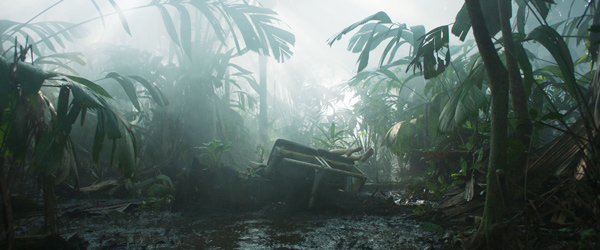Smite Material: Marais Unearths Jungle Cliches
It’s been over a decade since South African director Pia Marais’ last feature, and she’s spent six years working on her latest, the ambitious but ultimately lackluster Transamazonia. There’s gleaming evidence of something brilliant hinted at within substantial themes concerning religious zealotry, deforestation and familial bonds as major contributions to an eroding, toxic force which coalesce, despite good and bad intentions, into a lethal equation for all parties. But strangely oblique character development and a myriad of narrative cliches undermine the possibilities of reaching beyond the obvious, leading to a sanitized, even romanticized version of what feels like rosy-tinted post-colonialist semantics.
Rebecca (Helena Zengel) works as a faith healer for her father Lawrence Byrne (Jeremy Xido) at an abandoned Baptist mission in the Amazon jungle. She’s something of a local sensation because nearly a decade prior she was the sole survivor of a plane crash in the jungle, and her father has fooled members of a local indigenous tribe to believe she is a miracle who has the gift to heal. Recently, Artur (Romulo Braga), the head of a logging company, has approached Lawrence as a last chance to save his wife, who has lapsed into a coma. Denise (Sabine Timoteo), the nurse tending his wife, has doubts about letting Rebecca have access to her, but strikes up a flirtation with Lawrence. Meanwhile, because Artur has been logging on land owned by an indigenous tribe, several members of whom also belong to Lawrence’s congregation, violence has erupted, a local road block curbing the loggers from causing further damage. Artur vows to remove his men indefinitely if Rebecca can save his wife.

Zengel is something of an interesting screen presence, seeing as she’s already carved out a filmography portraying troubled, displaced girls, such as in Nora Fingscheidt’s System Crasher (2019) and Paul Greengrass’ News of the World (2020). Here she’s modeled in the form of an adolescent Marjoe Gortner or Aimee Semple McPherson, a poster child for evangelist charlatans. But Marais is missing something in the details regarding the film’s significant twist regarding Rebecca’s origins. In the nine years since her mother’s death, it’s strange Rebecca never inquires about her deceased mother. Likewise, Lawrence doesn’t seem to have fashioned any sort of explanation regarding their past, which only rears its head thanks to a coincidental nurse played by Sabine Timoteo, who is apparently only on hand as a catalyst rather than a character. The innocent naïveté of Rebecca also feels a bit drowsy, considering we’re never quite sure how deeply she accepts her father’s insistence she is a miracle worker. Marais prefers to keep these elements ambiguous, whereas some members of their ersatz congregation choose to interpret her as a ‘hopeful’ presence motivating them to overcome despair of their conditions. At other key moments, it would seem Rebecca is indeed magical, though how she interprets what she’s ‘channeling’ isn’t exactly clear, which means her internal struggle is almost entirely ignored.
Jeremy Xido, who feels like the friendly version of Vincent Gallo, tends to grate as a character who is both inscrutable and obnoxiously earnest. His machinations, which lead him into the eye of the story’s storm, don’t lead to any sort of dramatic conflict or tension considering his daughter’s talents are never really in doubt. While DP Mathieu De Montgrand does manage to capture the lush beauty of the Amazon, utilizing plenty of bird’s eye and landscape shots, there’s still a considerably small-scale energy to a film which constantly suggests grand consequences. Its narrative strengths, such as the relationship Rebecca has with two indigenous teens, are of greater recurring interest, perhaps because they suggest she has her own world view, though this isn’t hinted at until the film’s final moments.
Considering the formidable lead characters Marais wrote for Rayna Campbell in Layla Fourie (2013) and Jeanne Balibar in At Ellen’s Age (2010), the intersecting counterparts of Transamazonia feel like something of a disappointment, her characters overwhelmed by a narrative of good intentions. It doesn’t quite go to hell, but if it had, then it would have been more interesting.
Reviewed on August 12th at the 2024 Locarno Film Festival (77th edition) — Concorso Internazionale section. 112 Mins
★★/☆☆☆☆☆


